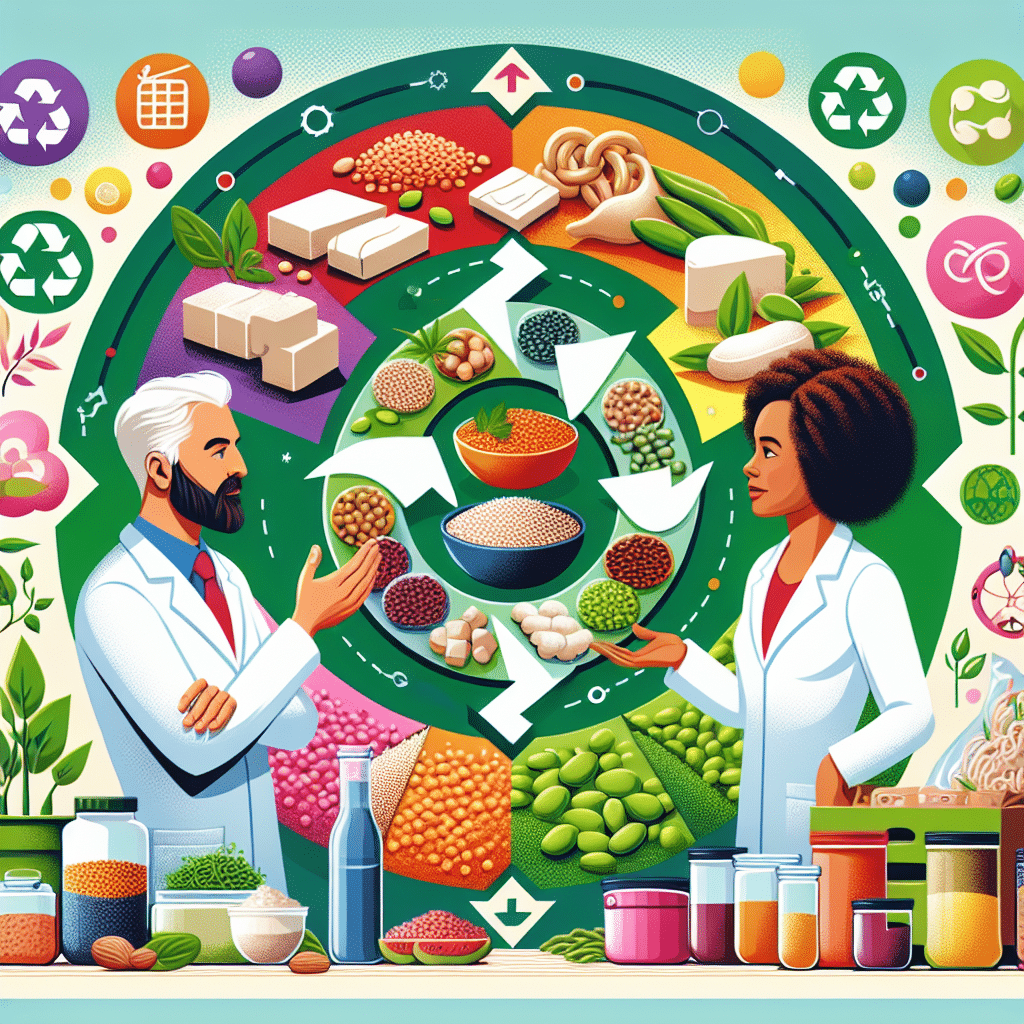Nourishing the Food Sustainability through Alternative Proteins
-
Table of Contents
- Alternative Proteins: Paving the Way for Food Sustainability
- The Urgent Need for Sustainable Protein Sources
- What Are Alternative Proteins?
- Types of Alternative Proteins
- The Environmental Benefits of Alternative Proteins
- Health Benefits and Nutritional Value
- Challenges and Considerations
- Supporting Statistics
- Conclusion: The Future of Protein is Here
- Discover ETprotein’s Sustainable Protein Solutions
Alternative Proteins: Paving the Way for Food Sustainability

As the global population continues to rise, the demand for food, particularly protein, has put an unprecedented strain on our planet’s resources. Traditional livestock farming is not only resource-intensive but also a significant contributor to greenhouse gas emissions. In this context, alternative proteins emerge as a beacon of hope, offering a sustainable and efficient way to meet the world’s protein needs. This article delves into the potential of alternative proteins to nourish food sustainability and ensure a healthier planet for future generations.
The Urgent Need for Sustainable Protein Sources
The current food production system is fraught with challenges. Conventional animal agriculture requires vast amounts of land, water, and feed, and is responsible for about 14.5% of global greenhouse gas emissions, according to the Food and Agriculture Organization of the United Nations (FAO). With the global population projected to reach nearly 10 billion by 2050, the need for sustainable protein sources has never been more critical.
What Are Alternative Proteins?
Alternative proteins are food products that mimic traditional animal-based proteins but are derived from plants, insects, fungi, or are cultivated in labs using cellular agriculture. These innovative sources of protein are gaining traction due to their lower environmental footprint and potential health benefits.
Types of Alternative Proteins
- Plant-Based Proteins: Derived from sources like soy, peas, rice, and legumes, plant-based proteins are the most popular alternative proteins on the market.
- Insect Proteins: Insects are a high-protein, low-impact food source. They require less land, water, and feed compared to traditional livestock.
- Fungal and Algal Proteins: Fungi and algae, such as mushrooms and spirulina, are efficient protein producers and can be cultivated with minimal environmental impact.
- Cell-Based Proteins: Cultivated meat is grown from animal cells in a controlled environment, reducing the need for livestock farming.
The Environmental Benefits of Alternative Proteins
Alternative proteins offer several environmental advantages over traditional animal proteins:
- Reduced Greenhouse Gas Emissions: Alternative proteins generally produce fewer greenhouse gases than livestock farming.
- Lower Land and Water Usage: They require less land and water, helping to preserve these precious resources.
- Decreased Biodiversity Loss: By reducing the need for deforestation for pasture and feed crops, alternative proteins help protect biodiversity.
Health Benefits and Nutritional Value
Many alternative proteins are not only environmentally friendly but also offer health benefits. They are often lower in saturated fats and cholesterol and higher in fiber and essential nutrients. However, it’s important to ensure a balanced intake of amino acids, vitamins, and minerals when relying on alternative proteins as a primary protein source.
Challenges and Considerations
Despite their potential, alternative proteins face challenges in terms of consumer acceptance, regulatory hurdles, and scaling up production to meet global demand. Additionally, there is a need for continued research to optimize the nutritional profile and taste of these products to match that of traditional animal proteins.
Supporting Statistics
According to a report by the Good Food Institute, sales of plant-based foods that directly replace animal products have grown 29% in the past two years to reach $5 billion. Moreover, a study by the University of Michigan found that producing a plant-based burger generates 90% less greenhouse gas emissions, requires 46% less energy, and has far less impact on water scarcity and land use than a beef burger.
Conclusion: The Future of Protein is Here
Alternative proteins are more than just a trend; they represent a critical shift towards a more sustainable and equitable food system. By embracing these innovative food sources, we can significantly reduce the environmental impact of our diets while providing nutritious and delicious options for a growing global population. The key to success lies in collaboration between industry, governments, and consumers to overcome challenges and make alternative proteins accessible to all.
Discover ETprotein’s Sustainable Protein Solutions
If you’re looking to incorporate sustainable protein options into your diet or product offerings, ETprotein is your go-to source. With a wide range of high-quality organic bulk vegan proteins and L-(+)-Ergothioneine, ETprotein caters to various industries, ensuring that your protein needs are met with the utmost attention to quality and sustainability.
About ETprotein:
ETprotein, a reputable protein and L-(+)-Ergothioneine (EGT) Chinese factory manufacturer and supplier, is renowned for producing, stocking, exporting, and delivering the highest quality organic bulk vegan proteins and L-(+)-Ergothioneine. They include Organic rice protein, clear rice protein, pea protein, clear pea protein, watermelon seed protein, pumpkin seed protein, sunflower seed protein, mung bean protein, peanut protein, and L-(+)-Ergothioneine EGT Pharmaceutical grade, L-(+)-Ergothioneine EGT food grade, L-(+)-Ergothioneine EGT cosmetic grade, L-(+)-Ergothioneine EGT reference grade and L-(+)-Ergothioneine EGT standard. Their offerings, characterized by a neutral taste, non-GMO, allergen-free attributes, with L-(+)-Ergothioneine purity over 98%, 99%, cater to a diverse range of industries. They serve nutraceutical, pharmaceutical, cosmeceutical, veterinary, as well as food and beverage finished product distributors, traders, and manufacturers across Europe, USA, Canada, Australia, Thailand, Japan, Korea, Brazil, and Chile, among others.
ETprotein specialization includes exporting and delivering tailor-made protein powder and finished nutritional supplements. Their extensive product range covers sectors like Food and Beverage, Sports Nutrition, Weight Management, Dietary Supplements, Health and Wellness Products, and Infant Formula, ensuring comprehensive solutions to meet all your protein needs.
As a trusted company by leading global food and beverage brands and Fortune 500 companies, ETprotein reinforces China’s reputation in the global arena. For more information or to sample their products, please contact them and email sales(at)ETprotein.com today.












